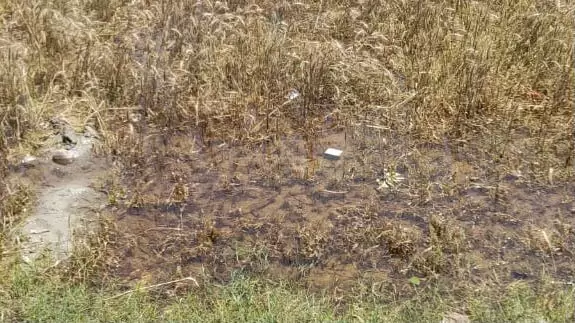The prices of green fodder have surged in Peshawar's livestock markets due to the degradation of fodder caused by heavy rains and river flooding.

In Patwar Kaly on the outskirts of Peshawar city, where fodder is typically cultivated near rivers and streams, the standing crops are rapidly deteriorating.
Waqar Khan, a 35-year-old farmer from Patwar Kaly, not only grows fodder for his animals but also sells it in the market. He lamented, "The rains have ceased, but the waterlogged fields continue to damage our fodder daily." Khan had cultivated maize and peaches for the upcoming Eid-ul-Adha season, both of which have been destroyed.
According to the Directorate of General Crop Reporting Service, Khyber Pakhtunkhwa, recent rains have severely damaged 43% of fodder crops in Peshawar. In the suburbs of Peshawar district, including Mian Gujjar, Shah Alam, Ashab Baba, and Patwar Kaly, farmers cultivated fodder on 13,463 acres of land this year, with 5,859 acres suffering damage. Mot grass, sorghum, and peach crops have been particularly affected.
The prices of green fodder have surged in Peshawar's livestock markets due to the degradation of fodder caused by heavy rains and river flooding. The price per maund has risen from Rs. 450 to Rs. 500 in markets outside the Ring Road. Traders anticipate that the increase in fodder prices will impact the prices of sacrificial animals during Eid-ul-Adha, making it challenging for citizens to afford them.
Dr. Jahan Bakht, Vice Chancellor of Agricultural University Peshawar, emphasized that climate change is now a stark reality. He urged farmers and agribusinesses to adapt to changing weather patterns and abandon traditional methods. Sensitizing farmers to the new weather patterns is crucial, as delayed sowing due to outdated practices can lead to increased crop and fodder damage.
Dr. Bakht advised farmers to avoid cultivating fodder near rivers and streams and to choose safer locations for foraging. He warned that damage to fodder crops could adversely affect the livestock sector.
Beyond Peshawar, other districts in Khyber Pakhtunkhwa also suffered significant fodder damage due to recent rains. Dera Ismail Khan, Bannu, Lower Dir, and Charsadda reported substantial losses, highlighting the widespread impact of the adverse weather conditions.